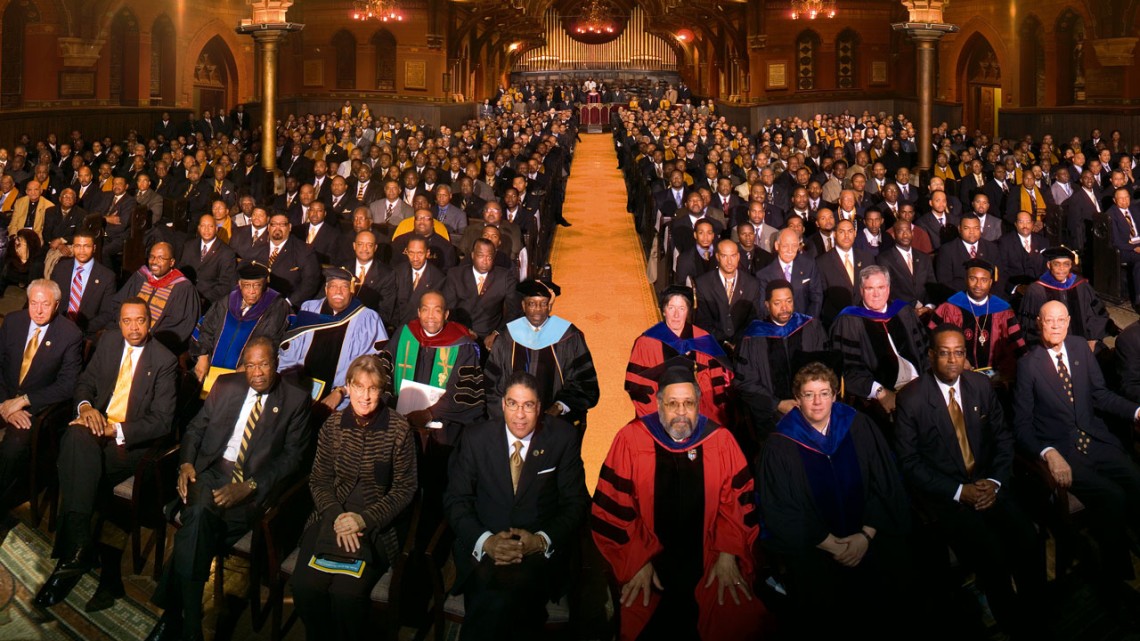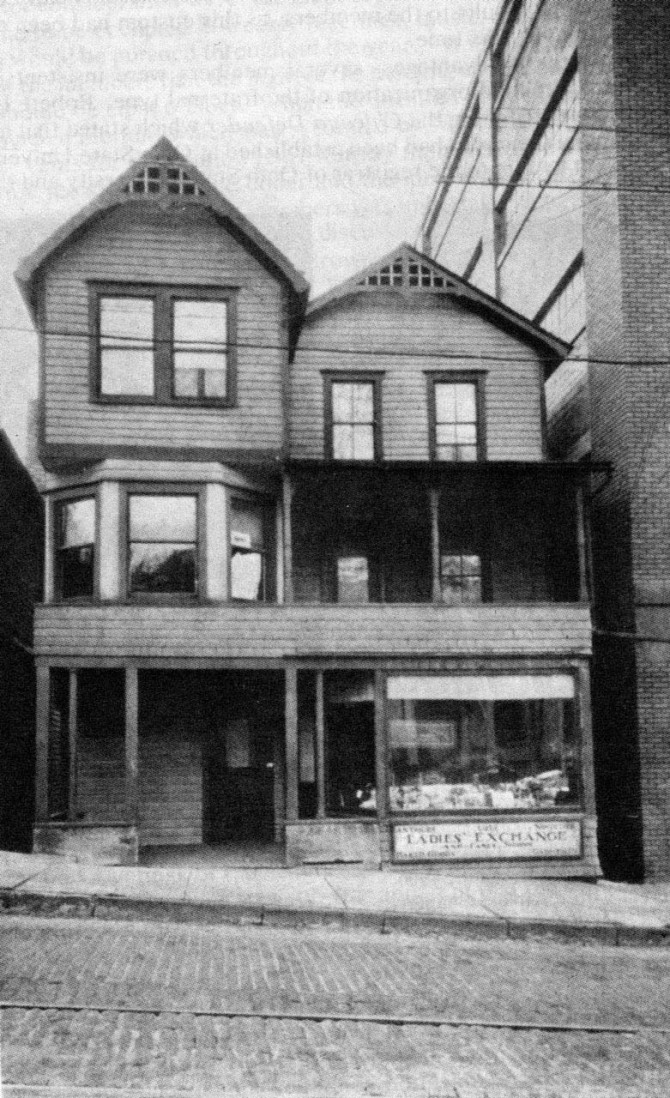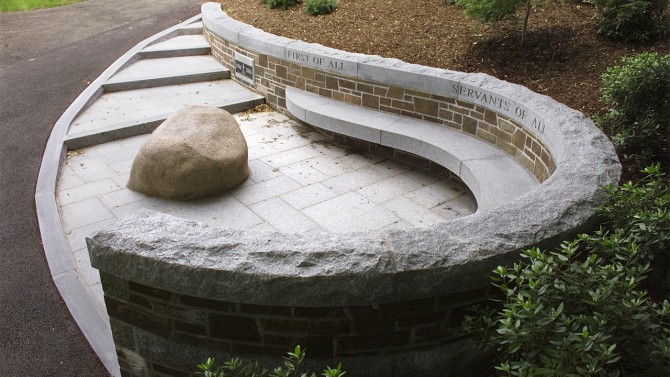
The members of Alpha Phi Alpha who made a pilgrimage to Cornell, along with community members, on Nov. 19, 2005 in Sage Chapel.
First Black fraternity to build monument at its birthplace
By Krishna Ramanujan
In the early 1900s, Cornell was one of a few major universities that welcomed Black students, but social segregation of the time prohibited them from living in campus housing.
Instead, Black students found lodging and community with local Black families; in a literary society formed in one of these houses, a group of students recognized that their white classmates found academic and social success by becoming fraternity members, which created support networks.
This realization led seven Black Cornell students to found the nation’s first African American fraternity, Alpha Phi Alpha, in 1906. The fraternity has since built approximately 900 chapters across the country and has championed civil rights; its illustrious alumni include Martin Luther King, Jr., W.E.B. Dubois, Duke Ellington and Thurgood Marshall.
Now, the founding chapter of Alpha Phi Alpha is celebrating the acquisition of two properties: 411 E. State St., its birthplace, which will be made into a monument; and 105 Westbourne Lane, purchased in Sept. 2021 for $1.5 million, which will become the first physical fraternity house owned by Alpha Phi Alpha in Ithaca.
“The memorial will realize an aspiration of our founding members, who dreamed of having a monument to the beginning of Black Greek letter fraternities and sororities in Ithaca, which will hopefully center attention around the reason why we were founded when we couldn’t be members in mainstream society,” said Ernest Eric Elmore ’86, J.D. ‘89, an antitrust attorney at the Federal Trade Commission in Washington, D.C. and former president of the Alpha Chapter Alumni Association.
These milestones will be celebrated at a groundbreaking and public fundraising kickoff weekend May 13-15, with a main event at 411 E. State St. on May 14 at 11 a.m. President Martha E. Pollack; Alpha Phi Alpha dignitaries, including Dr. Robert L. Harris, Jr., the fraternity’s national historian; and Ithaca Acting Mayor Laura Lewis will be among the speakers.
Since its inception, Cornell’s “any person… any study” motto made it unique among U.S. universities, providing the opportunity for a former slave, G.W. Fields, J.D. 1890, to become the first Black graduate of Cornell Law School, for example. By the early 1900s, when around 20 Black students attended Cornell, it was mandatory for white women to live in campus dorms, but Black women were not allowed. Black students could not join fraternities, though some of them worked in Greek-system houses.
The fraternity idea was hatched at 421 N. Albany St, a house owned by a Black family that became a meeting place for a literary society that included both Black men and women, where they discussed topics of the day, including their contributions to and exclusions from U.S. culture.
“As African Americans in the age of social segregation in the early 1900s, they felt it was important to come together and support one another and navigate Cornell and Ithaca, so a number of members of that study group wanted to become a fraternity,” Elmore said.
The group was split between those who saw the benefits and those who felt that, as African Americans, they lacked connection to a Greek system. During a meeting at 411 E. State St. on Dec. 4, 1906, the seven founding members – dubbed the Seven Jewels – voted to formally found Alpha Phi Alpha.
With that history in mind, 411 E. State St. was donated to the fraternity in February by Frost Travis, president of Travis Hyde Properties, a development and property management firm. The old building was torn down in the late 1960s and is now an overgrown vacant lot.
With the groundbreaking event on May 14, the Alpha Phi Alpha Fraternity, Inc., through an affiliate nonprofit, Jewels Heritage Project, Inc., has plans to rebuild a facade in the fashion of the original house as part of a monument plaza. Freestanding walls within the plaza will feature the history and significance of the first Black intercollegiate fraternity in the U.S.; notable Alpha Phi Alpha brothers; the story of Cornell’s openness to Black students that made the fraternity’s founding possible; the intersections of the Cornell and Ithaca Black communities; and the history of the expansion of Alpha Phi Alpha and the establishment of other Black-Greek fraternities and sororities around the country.
The site will serve as a key presence for fraternity brothers who make “pilgrimages” to Cornell to explore their roots, Elmore said.
On May 14, the Jewels Heritage Project will launch a public fundraising campaign to raise $4 million; half of which will go towards building the monument, with the other $2 million supporting maintenance and operating expenses. The hope is to complete the construction within two years.
While the fraternity would also like to acquire 421 N. Albany St., the house is not for sale. The group has hopes that the property, which is currently dilapidated, will be restored and maintained for its historical significance.
The 9,000 square-foot, 15-bedroom house on Westbourne Lane in the Cornell Heights Historic District in Ithaca will serve as the first physical “House of Alpha” in Ithaca. It takes the place of a previous Alpha Phi Alpha residence at 409 Elmwood St. that was owned by Cornell University and members of the fraternity resided in from the late 1970s to the mid-1990s.
A fundraising event at the new house on May 13 will begin a process of financing substantial required renovations, with plans for occupancy by fall 2024. The fraternity is currently seeking approvals from the city for those renovations. “There are three really big events in the history of the fraternity,” said Reginald White ’83, vice president of human resources at Connecticut College, a member of the Alpha Chapter Alumni Association and a project manager for the renovation. The first two events included the fraternity’s founding and its centennial, which was celebrated in Ithaca in 2005 and 2006.
“This feels to us like the third most important element,” White said. “Now, we have a physical structure representing the historical significance of our presence and connection to Cornell.”
The new house and the monument promise to provide historical value not only for the local Black community, but also for upstate New York. The area is known for the Harriet Tubman House in Auburn, New York, and the St. James AME Zion Church in Ithaca, which was part of the Underground Railroad. Ithaca is also the birthplace of Alex Haley, author of “Roots” and “The Autobiography of Malcom X,” whose father was a member of Alpha Phi Alpha.
“This monument will be part of a larger Ithaca Freedom Heritage Trailways,” Elmore said. “We welcome being part of that African American history and the significant cultural spots that are in Ithaca and the greater Central New York area.”
Get Cornell news delivered right to your inbox.
Subscribe



